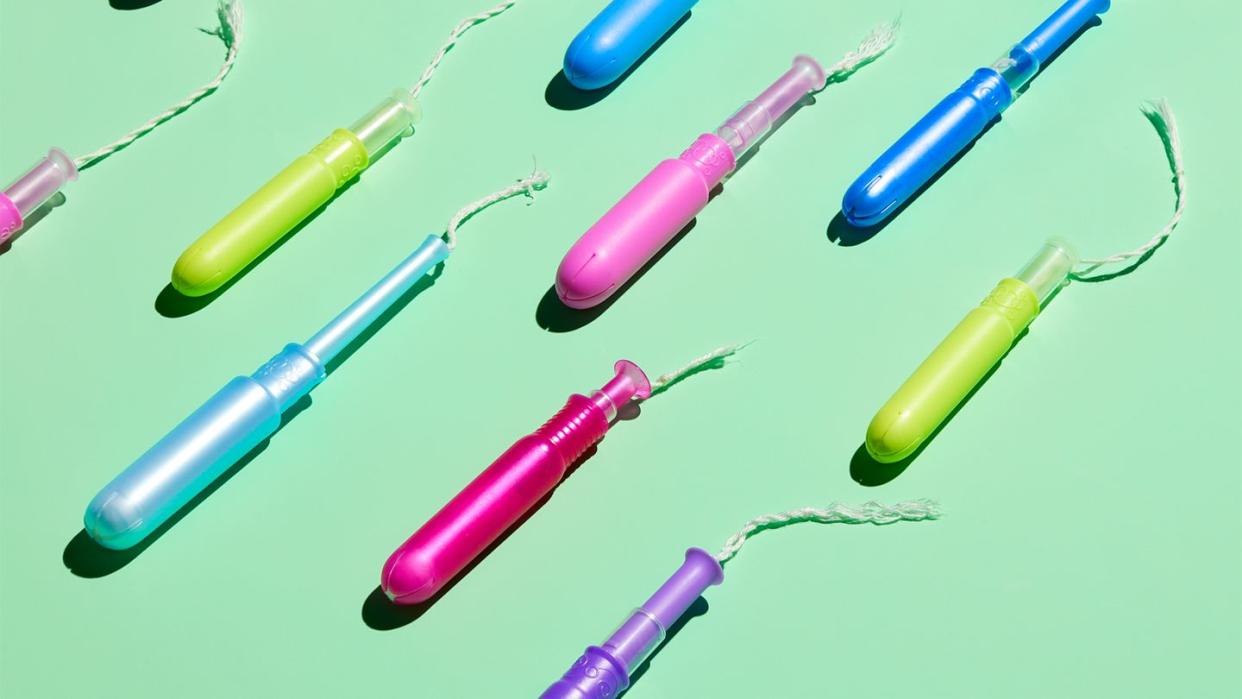A New Study Found Lead And Arsenic In Tampons. Experts Explain Why You Shouldn't Panic

As if dealing with a monthly period wasn’t bad enough, a new study suggests that there could be toxic metals in your tampons.
According to a study published in the journal Environment International in June, researchers found “several toxic metals,” including lead and arsenic, across 14 brands of tampons. But experts say you shouldn't toss the menstrual products just yet.
"We know the metals are there, but we don’t know how much gets into the body,” Jamie Alan, Ph.D., an associate professor of pharmacology and toxicology at Michigan State University, tells Women's Health.
Here's what to know about the links between toxic metals and tampons, including if the products are currently safe to use.
Meet the experts: Christine Greves, M.D., an ob-gyn at the Winnie Palmer Hospital for Women and Babies in Orlando, Florida. Jamie Alan, Ph.D., an associate professor of pharmacology and toxicology at Michigan State University. Jenni Shearston, Ph.D., M.P.H., the study's lead author and a postdoctoral scholar at the University of California Berkeley School of Public Health.
Is there lead or arsenic in tampons?
According to this newly-published study, yes. Researchers analyzed materials from 18 products lines from 14 brands of tampons. They picked from products listed as "top sellers" from an online retailer and store-brand versions from New York City, Athens, Greece and London.
Researchers then measured the presence of 16 metals, all of which were found in measurable traces. "Several toxic metals," including lead, were detected.
But it wasn’t just lead: The study also found “measurable concentrations” of arsenic, barium, calcium, cadmium, cobalt, chromium, copper, iron, manganese, mercury, nickel, selenium, strontium, vanadium, and zinc, too.
“We detected all 16 metals in at least one sampled tampon, including some toxic metals like lead, that has no ‘safe’ exposure level,” the study says.
Unfortunately, the study didn’t name which brands of tampons they researched, only noting that the tampons are available in the United States, United Kingdom, and Greece. The researchers pointed out “nonexistent” regulations in those countries don't require companies to test their products for harmful chemicals or metals.
Are organic tampons safer than non-organic?
The researchers discovered that levels of lead were higher in non-organic tampons, while levels of arsenic were higher in organic tampons.
"No category had consistently lower concentrations of all or most metals," the study says.
This isn't great news, since researchers also noted that the vagina has more permeable skin than other parts of the body. That skin allows it to absorb chemicals that “directly enter systemic circulation.”
However, the study notes that further testing should be done to replicate their results and measure the presence of other chemicals in tampons. It is the first study of its kind to research metal levels in menstrual products.
So, are tampons safe?
You may be freaking out right about now, but you shouldn't throw out your tampons just yet. The University of California, Berkeley press release notes that "it’s unclear if the metals detected by this study are contributing to any negative health effects."
Christine Greves, M.D., an ob-gyn at the Winnie Palmer Hospital for Women and Babies in Orlando, Florida, adds that you shouldn’t panic based on the results of one study. Dr. Alan agrees.
“We are exposed to these metals every day and we even need some of these metals, like zinc, for our body to function,” she tells Women's Health.
It’s important to point out that even the study’s researchers tell tampon users "not to panic." Jenni Shearston, Ph.D., M.P.H., the study's lead author and a postdoctoral scholar at the University of California Berkeley School of Public Health, notes that "we do not yet know if metals can leach out of the tampon and whether they are absorbed by the body."
"We therefore cannot yet assess to what extent (if any) metals in tampons contribute to any health problems," she tells Women's Health. "We definitely need more research on this severely understudied area, especially because millions of people could be affected."
If you're freaked out by the findings, there are other ways of dealing with period blood. “You can use pads or menstrual cups, if you’re concerned,” Dr. Greves says.
The study's author Dr. Shearston agrees, noting, "it's too soon for us to recommend people use a specific kind of menstrual product."
"What your readers can do is push for better labeling of ingredients in tampons and other products, and for more testing of products to make sure they don't contain toxic chemicals," she adds.
You Might Also Like


